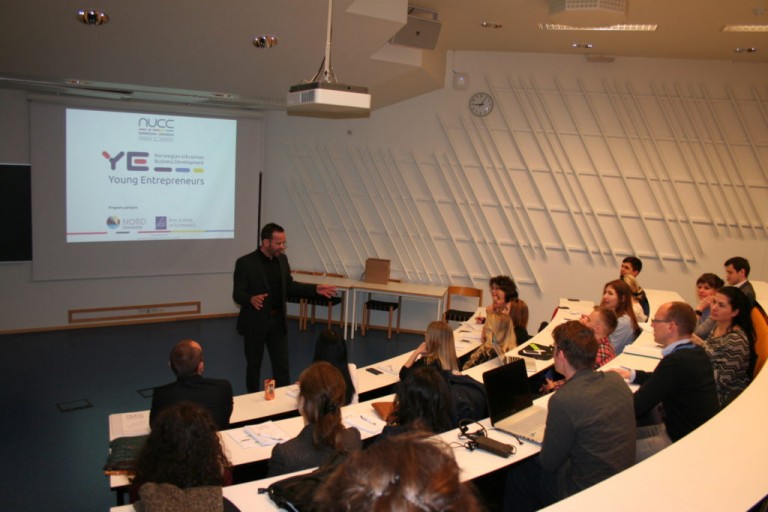
Young Entrepreneurs 2016: Kick-started in Northern Norway
From 20th to 24th April 2016, the first session of this year´s Young Entrepreneurs program took place in Northern Norway. Together with our highly ranked program partners, Nord University and Kyiv School of Economics (KSE), Norwegian-Ukrainian Chamber of Commerce (NUCC) conducted a diversified program combining lectures and presentations, practical group work, business visits and social activities.
Young Entrepreneurs – what is it about
The idea of the Young Entrepreneurs program is to bring together talented and ambitious business-minded people from Norway and Ukraine. Through active dialog and development of concrete business cases, the participants get first-hand and professional guidance on creating and doing business in and between Norway and Ukraine.
The interest for the second edition of the Young Entrepreneurs was impressively high with almost 250 applicants. After a three weeks selection process, 20 candidates with a diverse background from four different countries had been identified. One thing though they all had in common: A goal of developing businesses between Norway and Ukraine. With other words, a good foundation for a successful program as the participants met in April 20th in Bodø.
Back to campus
After a long day on travel, all participants and their luggage arrived Wednesday afternoon on time. In the evening, all participants met for the first time at an informal welcome dinner on Nord University´s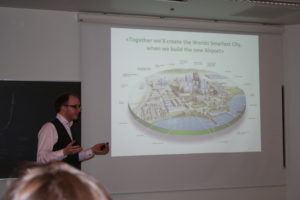 campus. There was no surprise that Norwegian salmon was on the menu.
campus. There was no surprise that Norwegian salmon was on the menu.
Thursday morning, Young Entrepreneurs 2016, was officially opened by Vice Dean at Nord University Business School, Frode Fjelldal-Solberg. Ahead of the participants, a mixture of both theoretical and practical oriented lectures, as well as meetings and presentations from local and regional authorities and business representatives were waiting. As introduction, the participants got input on the current trade pattern and the Norwegian and Ukrainian business culture. Not all were aware of the statistics of traded food goods which are dominated by Norwegian seafood export to Ukraine and import of Ukrainian sunflower seed to Norway. As doing business in Ukraine is challenging for foreign companies and corruption still is present in many sectors, it is important to stress the topics good governance, transparency and business ethics. Associate professor Are Ingulfsvann, did this in a good way.
Later that day, the participants were introduced to one of Norway´s largest and most ambitious projects: “New city – new airport”. Project manager Daniel Bjarmann-Simonsen from Bodø Municipality shared the new plans for the city where the existing airport will be removed and thereby releasing 360 hectares for building a new and smart city, big enough to house 25.000 people. Maybe Bodø could inspire Ukrainian stakeholders and politicians in their work of transforming Ukrainian cities to become smarter? After a long day with lections, it was time to explore the city of Bodø and enjoy a new salmon meal.
Friday morning, the program continued with engaging lectures by PhD Dean, Erlend Bullvåg, on entrepreneurship and entrepreneurial thinking, “the ability to identify, assess and shape opportunities in variety of contexts”. Based on NUCC prioritized industry sectors, energy, ICT, agriculture and seafood, the students worked out small cases in order to enhance the trade within their specific sectors. After all ten presentations, the participants voted for the best case. The winners, Olga and Yulia, came up with a business idea on starting garlic production in Ukraine, which is mainly imported from China today. This could also lead to an enhanced export of agro products from Ukraine to Norway and EU.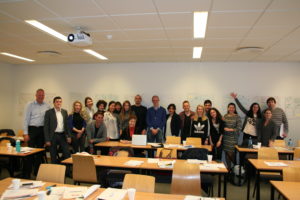
Before leaving Bodø, the group made a stop by Pelagia Bodø Sildoljefabrikk, an innovative fishmeal and fish oil producer, important components in fish-and animal-feed; an industry which rely on marine products but also roughly 70 % agricultural produce, which could potentially be produced in Ukraine and thus increase the trade between Ukraine and Norway. According to plant manager, Jon Vestengen, today Latin American has an 80% market share in supplementing Norwegian fishfeed with components, of both marine and vegetable produce. The visit ended with a guided tour in the production plant and the participants were impressed by the plant´s efficiency (achieving a high turnover with only three persons present in the production at the same time). After two days in the regional centre of Bodø, it was now time to head to Svolvær, the largest town on the Lofoten islands.
Lections in scenic landscape
When asking foreigners what they associate with Norway, it is likely that at least some of them would mention the Lofoten islands. Known for its steep and spectacular mountains, Lofoten is one of Norway´s most popular destinations among foreign tourists. However, the participants were not on holiday. Saturday morning, we were lucky to have two speakers with extensive experience from doing business in and with Ukraine. Øyvind Sætren, a business developer in Pelagia, Norway’s largest producer of pelagic fish, shared his experience from working in the Ukrainian market where challenges with corruption, regulations and standards are present. Irina Roddvik, special advisor by Telenor Group and involved in Telenor´s market entrance in Ukraine, was lecturing in challenge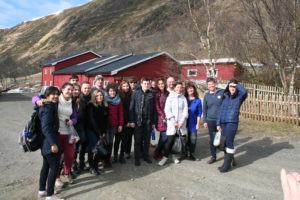 s in multi-cultural context. As Roddvik said, “a good start is to understand what to do”. Further, Roddvik stressed the importance of understanding the culture of doing business and the local network, which should not be ignored under any circumstances.
s in multi-cultural context. As Roddvik said, “a good start is to understand what to do”. Further, Roddvik stressed the importance of understanding the culture of doing business and the local network, which should not be ignored under any circumstances.
After inspiring lectures, it was time to get a sneak-peak of the islands by visiting two farmers. The first stop was by Åland farm, a family-run small-scale producer of goat cheese and herbs. In addition, the farm offers bookable products for the passing tourists, such as collecting herbs and playing with the animals. The farm sells their cheese throughout Norway and even exports its brown-cheese to an exclusively restaurant in Copenhagen. The different cheeses were a success among the group, which resulted in increased sale for the farm this day. From Åland farm the group was heading to a modern medium-sized family-run farm with robotized milking facilities.
Both farms were shareholders in the food business cluster Lofoten Mat, consisting of more than 100 partners. The aim of the organization is to make Lofoten visible as a culinary region and contributing to economic growth within the food industry. A constellation like Lofoten Mat could potentially be a model for Ukrainian small-scale agro and tourism players wanting to up-scale its activities.
Group work across boarders:
However, Young Entrepreneurs is not only about university lectures and meeting businesses. An essential part of the program is work with specific business cases, which aim is to look into different relevant industries and in the long-run contribute to increased trade and/or investments between Norway and Ukraine.
Today, the largest component of the limited agricultural trade between Norway and Ukraine is produce for animal feed in Norway. Implying that there is a window of opportunity for Ukrainian agro-products for the Norwegian market, which is not able to domestically produce the internal food demand, that being human feed or animal feed. Thus, two groups are urged to delve into the possible trade opportunities this entails. Two other groups will work on the topic “smart cities”, where they have been challenged to develop a new smart city-phenomenon (based on one of the “smart pillars” or map good practices from existing smart city projects. They will then introduce the idea to city authorities and potential investors and donors.
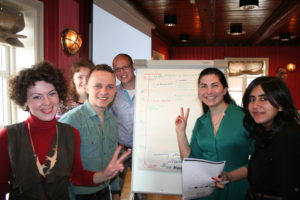 Next stop: Ukraine
Next stop: Ukraine
After four successful days in Northern Norway, we are now in the planning phase for the next session which will be held in Ukraine mid-June. In Kyiv and Lviv, the participants will attend lectures with prominent scholars, get updates on the ongoing reform work in Ukraine and meet with Norwegian and Scandinavian enterprises who are already operating in the Ukrainian market. The third and last session will be in Oslo in September.
By following us on Facebook, you will get frequently updates from the next sessions of the Young Entrepreneurs program.
Finally, NUCC wants to express its gratitude to all applicants for showing interest for the program, its program partners Nord University and Kyiv School of Economics, its program funder the Norwegian Ministry of Foreign Affair and all contributors who made the program possible:
Frode Fjelldal-Solberg, Vice Dean, Nord University Business School
Veronika Vakulenko, PhD research fellow, Nord University Business School
Torbjørn Trane Jensen, senior adviser in Nordland County Council
Daniel Bjarmann-Simonsen, Project manager “New City – new airport”, Bodø Municipality
Andrey Mineev, Business Index North, researcher Nord University
Are Severin Ingulfsvann, associate professor Nord University
Erlend Bullvåg, PhD Dean Nord University
Jon Vestengen, plant manager Pelagia Bodø Sildoljefabrikk
Øyvind Sætren, controller Egersund Fisk/Pelagia
Irina Roddvik, special advisor Telenor Group/PhD research fellow Nord University
Anne Karine Statle, managing director Lofoten Mat
Knut and Tove Åland, farmers and owners of Åland farm
Leif Kåre Halvorsen, farmer and owner of Solvang farm




